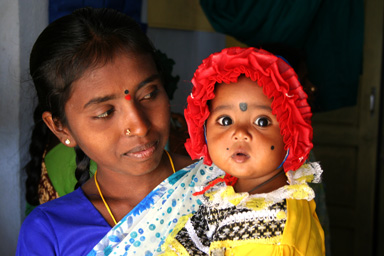What integration means to a mother in Africa
|

Picture the complicated everyday life of a mother in a developing country.
Secretary of State Hillary Clinton asked audience members to call up this mental image as she discussed the President's Global Health Initiative last week, and its aim to be more comprehensive and less single issue-focused than many global health efforts in recent years have been.
“The constellation of logistical, structural, legal, and political problems [decrease] health and make life tenuous for the woman that I described ...” she said. “As long as they persist, that will limit our or any donor's impact. Women we save from AIDS will die in childbirth. Children we save from polio will die from rotavirus.”
Clinton shared another example: A mother's home may be sprayed for mosquitoes, but without access to clean water, her children may escape malaria only to die from diarrheal disease. This lack of coordination also makes it logistically impossible for her to access what little is available.
“Diseases are often treated in isolation rather than bundled together, forcing people like this woman to travel to multiple clinics to meet their and their children's basic health needs. Family planning supplies may be available at one clinic several miles away, while oral rehydration therapy may be elsewhere. With the help of the President's Global Health Initiative, we need to work together to eliminate inefficient and unproductive use of aid dollars where these gaps exist.”
I thought about the mother in Secretary Clinton's speech a few days later, when I spent an afternoon with a friend and her six month old baby. She shared with me the many steps she takes on a daily basis to give her new daughter a strong, healthy start to life, including very basic tasks, like keeping her clean and well-nourished. To me this sounded like a full time job, even in a place like Washington, DC, when safe water and adequate sanitation are available. I couldn't imagine being a mother in a developing country, wanting the same thing that every mother wants for her child, and being unable to provide her with even the most basic necessities for survival.
Few issues better highlight the nature of this disparity than diarrheal disease. Diarrhea is typically a mere inconvenience for children in developed countries, but it remains the second leading cause of mortality in children under five worldwide. But since there are more simple, proven solutions to fight it than any other major childhood killer, the potential to save many lives is great. It made perfect sense to hear Secretary Clinton feature diarrheal disease so prominently when making her case for integration.
Integration of prevention and treatment solutions for diarrheal disease represents a great return on our foreign aid investment and is an ideal case study for the integration proposed by the Global Health Initiative. And ultimately, it means that the mother called to mind in Secretary Clinton's speech is one step closer to giving her children a healthy start to life.
-- Hope Randall is a Program Assistant for diarrheal disease communications and advocacy at PATH.














